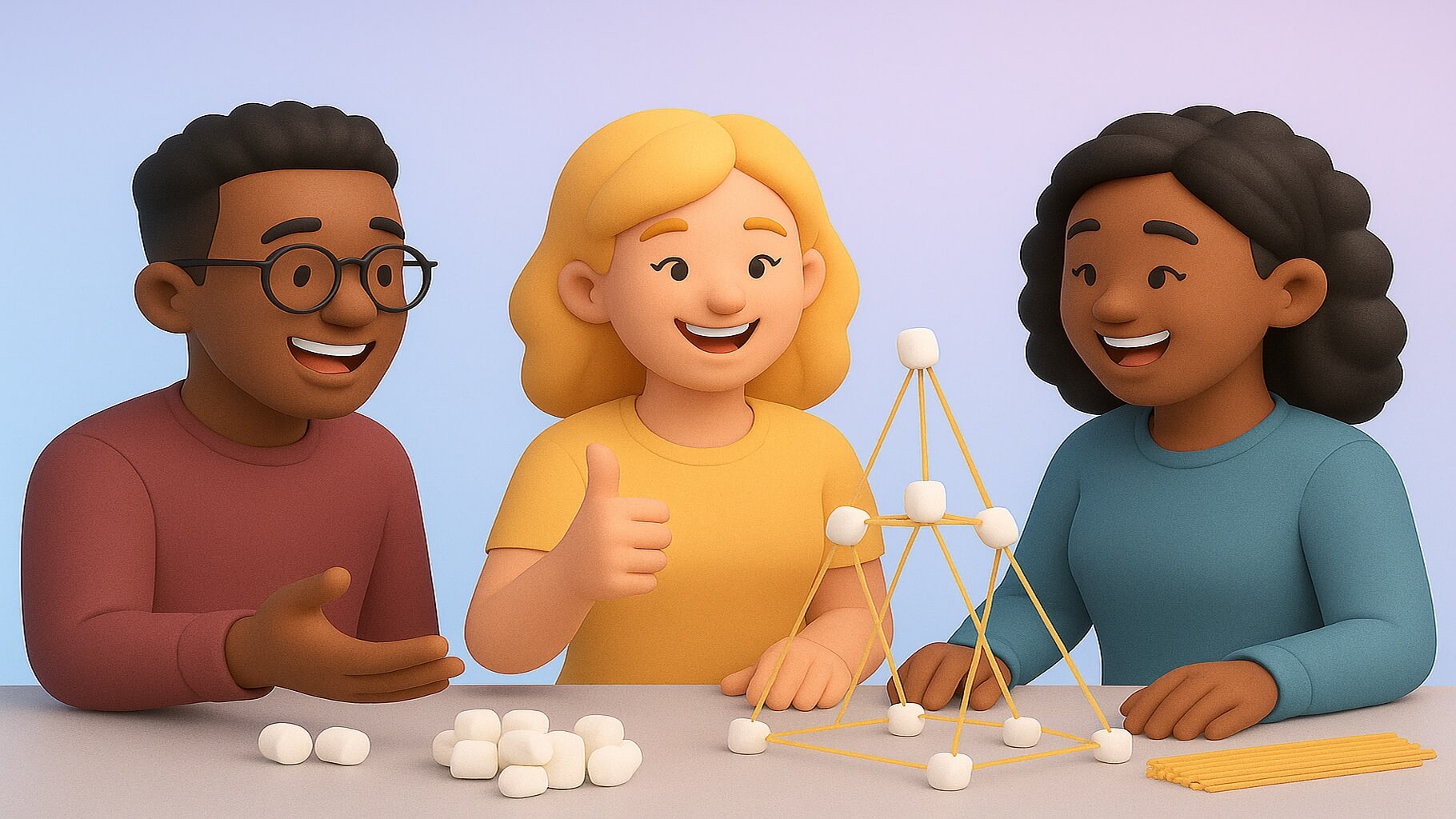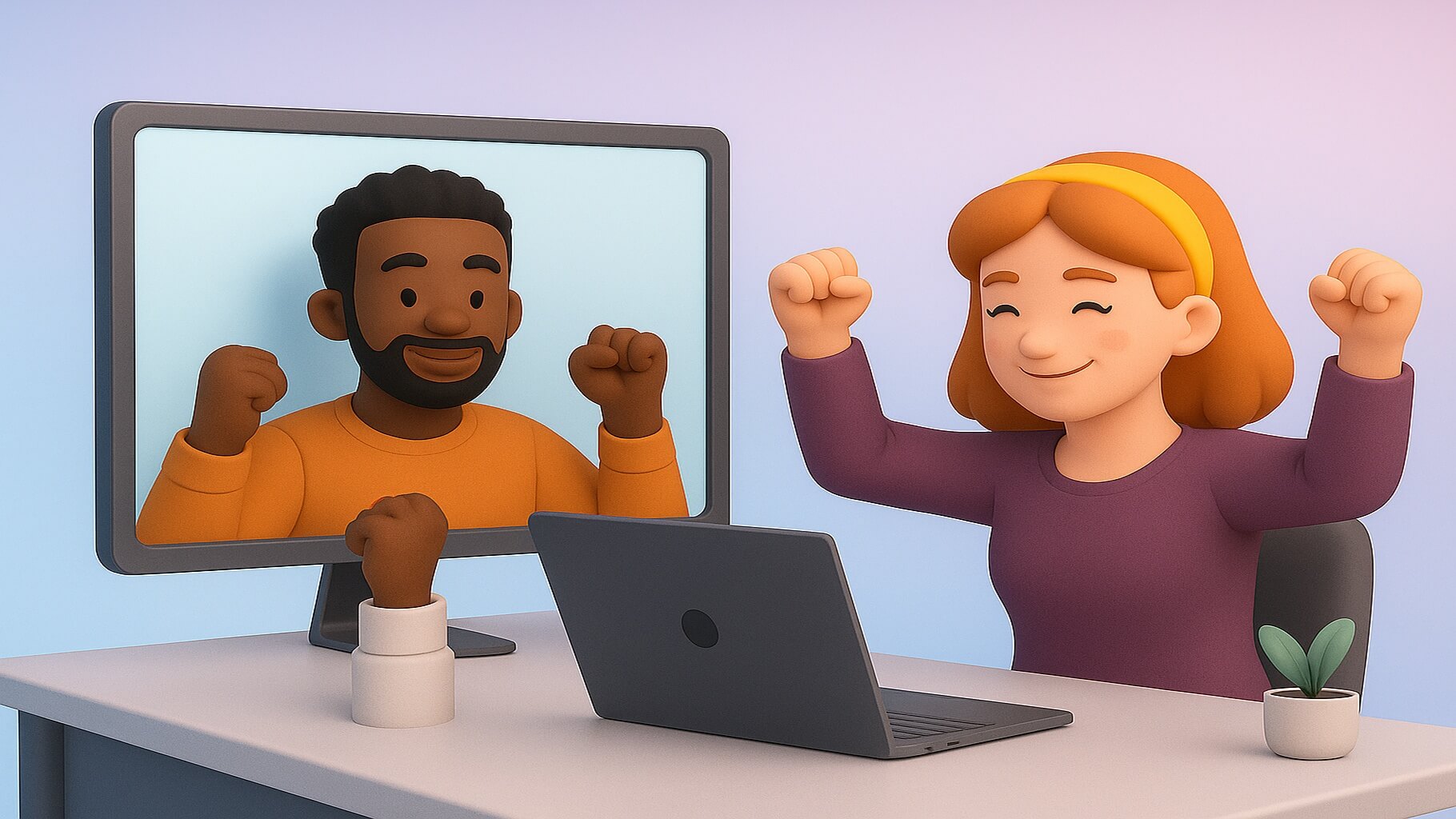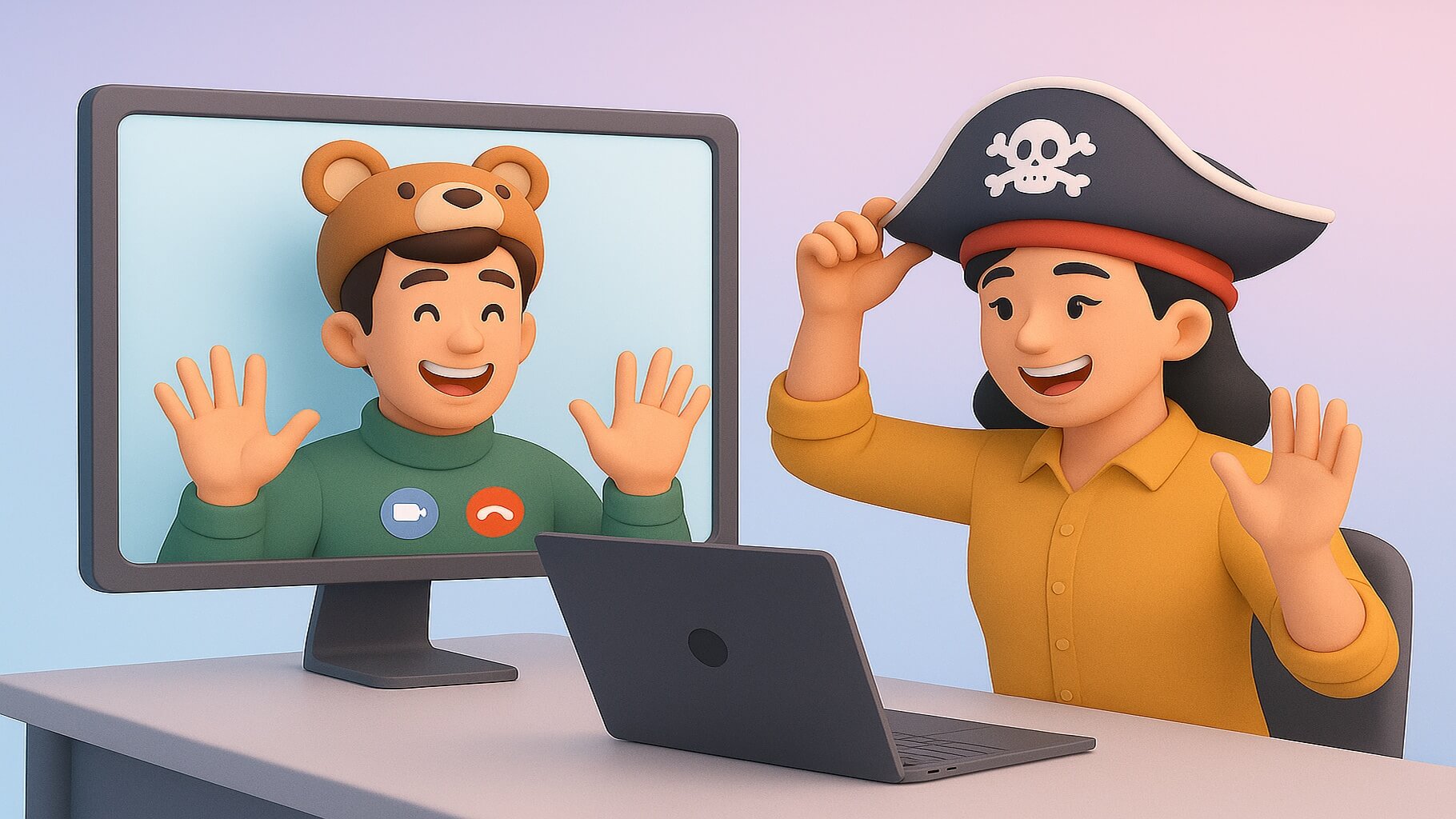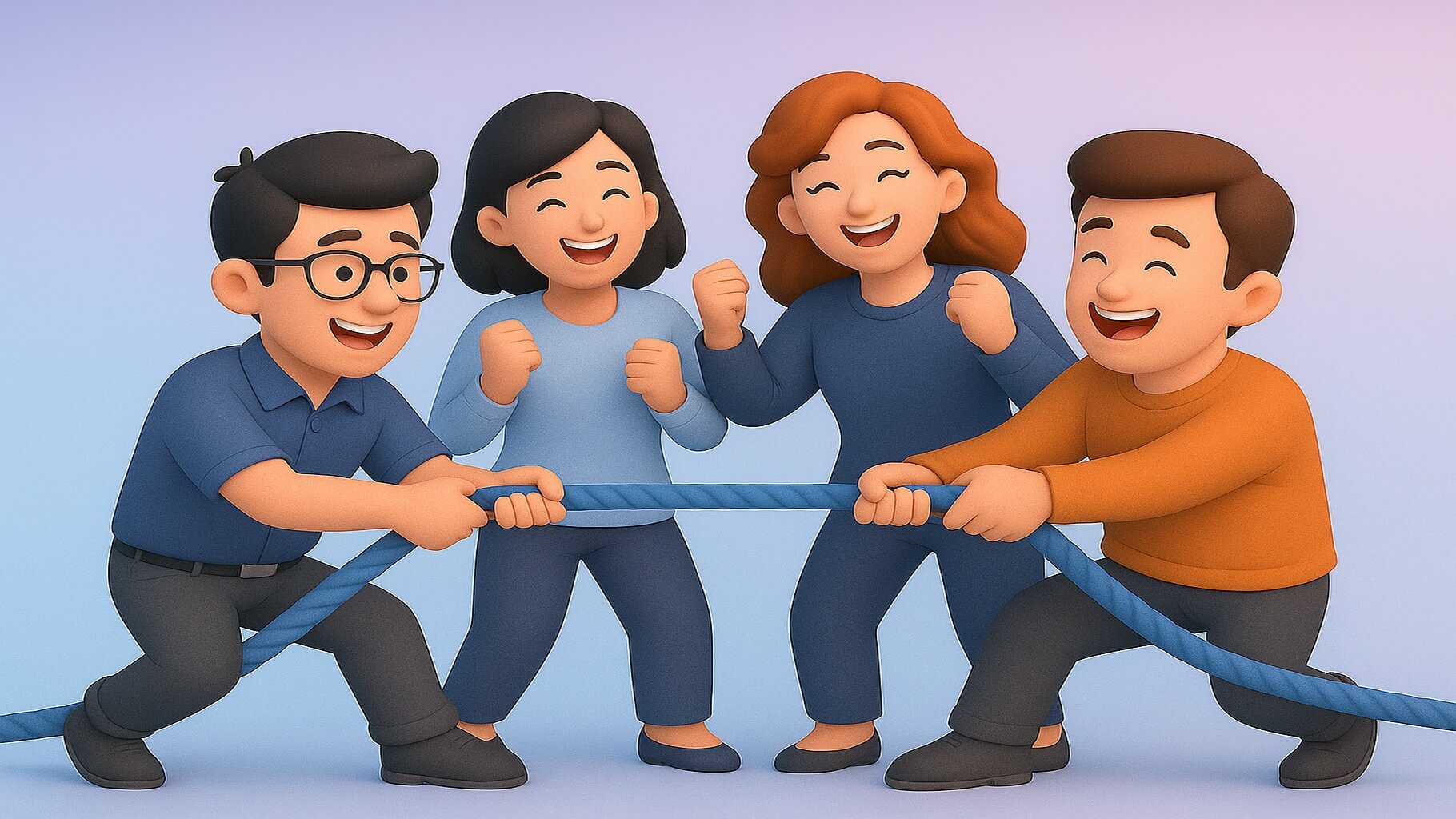
Creating an energized workplace requires more than mandatory meetings and standard procedures. At Matter, we understand that building strong teams demands creativity, engagement, and activities that genuinely excite employees. Fun team challenges offer a powerful solution, transforming routine workdays into opportunities for connection, collaboration, and memorable experiences that strengthen team bonds.
The modern workplace faces unique obstacles in maintaining team cohesion, especially with remote teams, hybrid schedules, and diverse personalities. Traditional approaches often fall short, leaving team members feeling disconnected or uninspired. By incorporating strategic team-building activities that prioritize enjoyment and engagement, organizations can break through these barriers and create environments where collaboration thrives naturally.
What makes fun team challenges effective?

Fun team challenges succeed when they strike a balance between entertainment and purpose, creating experiences that team members genuinely enjoy while developing essential workplace skills. These activities go beyond simple games, incorporating elements that foster communication skills, build trust, and strengthen relationships across the entire team. The most effective team-building activities create lasting, positive memories while addressing real workplace dynamics, ensuring that new team members integrate smoothly and that existing team members deepen their connections.
Understanding the psychology behind fun team-building challenges
The science behind successful team-building challenges reveals why enjoyment plays a crucial role in engagement. When team members participate in fun activities, their brains release endorphins and dopamine, creating positive associations with colleagues and the workplace. This neurological response strengthens bonds more effectively than formal training sessions, particularly when incorporating creative collaboration between different group members.
Key psychological benefits include:
- Reduced stress and anxiety in team interactions
- Increased trust through shared experiences
- Enhanced creativity from playful environments
- Improved memory retention of team connections
- Stronger emotional bonds help team members learn about each other
Research shows that laughter and play activate the same brain regions involved in problem solving and creative thinking. This connection explains why teams that play together often innovate more effectively and overcome challenges with greater resilience. When one team member notices that others are actively engaged, it sets off a positive chain reaction that affects the entire team.
How do fun challenges differ from traditional team building?
Traditional team building often feels forced or overly structured, focusing on outcomes rather than experiences. Fun challenges flip this approach, prioritizing engagement and natural interaction over rigid objectives. Where traditional methods might involve lengthy workshops or formal presentations, modern approaches foster genuine connections that work equally well for in-person teams and virtual environments.
The key differences include:
- Focus on voluntary participation versus mandatory attendance
- Emphasis on laughter and enjoyment over serious objectives
- Flexible formats that adapt to team energy and help build team trust
- Natural conversation starters rather than scripted interactions
- Immediate positive feedback instead of delayed results
These distinctions matter because they determine whether team members view activities as obligations or opportunities. When challenges feel genuinely fun, participation becomes enthusiastic rather than reluctant, leading to more authentic connections and better outcomes. Many team-building activities fail because they ignore these fundamental differences.
Why fun team challenges for work improve performance
Performance improvements from fun challenges extend far beyond temporary morale boosts. Teams that regularly engage in enjoyable activities together develop stronger communication patterns, better conflict resolution skills, and increased innovation capacity. These benefits translate directly into measurable workplace outcomes, especially when activities enhance collaboration skills across departments.
The connection between fun and performance isn't coincidental. When other team members see colleagues enjoying work together, they communicate more openly, share ideas freely, and support each other through challenges. This collaborative spirit becomes the foundation for sustained high performance, particularly important for your next team meeting or upcoming team event.
15 fun team-building challenges for instant engagement

Creating instant engagement requires activities that capture attention immediately and maintain energy throughout. These challenges are effective because they require minimal setup while delivering maximum impact, making them perfect for teams looking to inject excitement into their regular routines. Each activity builds specific skills while keeping the entire group entertained and involved, ensuring both new and established team cohesion.
15 engaging team-building challenges:
- Reverse charades - One team member guesses while the entire team acts out clues
- Two truths and a lie - Classic game with creative twists
- Speed networking - Quick rotations for team members to share fun facts
- Story chain - Each team member writes one sentence to create a collaborative story
- Human knot - Groups untangle themselves without letting go of hands
- Balloon keep-up - Groups work together to keep balloons airborne
- Group juggle - Pass multiple objects while team members learn names
- Silent line-up - Organize by birthdate without speaking
- Blind drawing - Partners describe images for others to draw without seeing
- Emoji conversations - Teams communicate using only emojis for specific scenarios
- Telephone pictionary - Combine drawing and whispering for hilarious results
- Memory wall - Teams create visual timelines of shared experiences
- Paper tower challenge - Teams vie to construct the tallest edifice utilizing solely paper.
- Marshmallow challenge - Build structures with spaghetti and marshmallows
- Photo scavenger hunt - Find and photograph specific items around the office. Quick fun challenges for team building
Time-conscious teams need activities that deliver impact without consuming entire afternoons. Quick challenges, in particular, benefit busy teams by fitting seamlessly into existing schedules. These effective team-building activities typically require just a few minutes but create lasting positive impressions that improve the team's problem-solving skills.
Successful quick challenges share these characteristics:
- Setup takes less than 2 minutes
- Clear instructions that everyone understands immediately
- Inclusive format welcoming all skill levels
- Natural conclusion within 5-10 minutes, suitable for any scavenger hunt group size
- Memorable moments that spark later conversations
10 quick fun challenges for team building
- Speed superlatives - Vote on fun awards like "Most Likely to Survive a Zombie Apocalypse"
- Quick change artist - Teams race to transform one member's appearance
- Fast facts relay - Share surprising personal facts in rapid succession
- 30-second pitch - Sell ridiculous products to teammates
- Quick memory test - Observe details about colleagues, then answer questions
- Speed sculptures - Create team representations with desk supplies
- Rapid rhyme time - Create team poems in under 3 minutes
- Quick category game - Name items in categories without repeating
- Fast Fibonacci - Build on each other's ideas in increasing time intervals
- Speed team crest - Design a team emblem in 5 minutes
Virtual team challenges have adapted these principles for remote settings, proving that distance doesn't diminish the power of quick, engaging activities. Whether in person or virtual, the key lies in selecting challenges that align with your team's energy and available time.
Creative competition-based team challenges
Competition adds excitement to team building when implemented thoughtfully. Strategic competitive challenges channel energy productively, ensuring that everyone feels valued. These activities transform rivalry into collaboration, building team spirit through collective achievement, especially important when public speaking skills vary among participants.
Elements that make competition constructive:
- Mixed skill requirements ensure diverse contributions
- Team-based scoring that encourages collaboration
- Rotating roles so everyone experiences different positions
- Recognition for creativity alongside winning
- Celebration of effort as much as results
10 creative competition-based team challenges
- Lip sync battle royale - Teams perform elaborate musical numbers
- Rube Goldberg machine contest - Build complex chain-reaction devices
- Office supply fashion show - Create wearable art from work materials
- Minute to win it Olympics - Series of 60-second silly challenges
- Commercial creation contest - Film funny ads for office supplies
- Paper airplane engineering - Design planes for distance, accuracy, and style
- Competitive storytelling - Teams act out improvised tales with props
- Puzzle race championship - Multiple puzzle types solved simultaneously
- Team logo design battle - Create visual identities under time pressure
- Office décor challenge - Transform spaces with limited budgets
Creative competitions might include office trivia tournaments, departmental cook-offs, or innovation challenges where teams pitch silly product ideas. The goal isn't determining winners and losers but forging connections through shared effort and laughter. Each team-building exercise works best when it celebrates the diverse talents of its participants.
Fun team challenges that build trust and communication
Trust and communication constitute the cornerstone of productive teams, yet building these qualities often feels forced in traditional settings. Modern approaches create natural opportunities for vulnerability, active listening, and mutual support, eliminating the need for awkward trust falls. These employee challenges transform workplace relationships through enjoyable shared experiences.
Effective trust-building activities incorporate:
- Gentle vulnerability that feels safe
- Opportunities for mutual support
- Nonverbal communication elements
- Shared problem-solving requires collaboration
- Celebration of collective achievements
Here's a list of 15 fun team challenges that build trust and communication:
- Secret mission partners - Pairs complete hidden helpful tasks for each other
- Voice only puzzle - Solve jigsaws with one person seeing, others touching
- Trust walk interviews - Guided walks while sharing professional stories
- Mirror movement exercise - Partners synchronize movements without speaking
- Compliment Relay - Pass genuine appreciation down the line
- Shared story building - Create narratives where each person adds details
- Communication telephone - Relay complex instructions through the team chain
- Silent team tower - Build structures using only gestures
- Trust recipe - Teams create dishes with divided responsibilities
- Empathy mapping - Partners share challenges while others listen deeply
- Collaborative drawing - Multiple people control one pen simultaneously
- Trust inventory - Teams list what builds and breaks trust
- Communication maze - Navigate verbal directions through paper mazes
- Assumption busters - Share surprises about backgrounds and experiences
- Listening Olympics - Competitive active listening exercises with rewards
Activities like "Minefield," where blindfolded team members navigate obstacles with verbal guidance, or "Back-to-Back Drawing," where partners describe images without seeing each other's work, naturally develop communication skills while maintaining engagement. These challenges demonstrate that building trust occurs most effectively through genuine interaction.
15 fun team games for different occasions
Different occasions call for different approaches to team engagement. A quarterly planning meeting requires a different energy level than a holiday party, and successful teams adapt their activities accordingly. Understanding how to match games to occasions ensures maximum participation and enjoyment while achieving specific goals for each gathering, whether it's welcoming new team members or celebrating the achievements of existing team members.
15 versatile team games:
- Meeting warm-up bingo - Custom cards with team-specific squares
- Workshop word association - Quick thinking exercises between sessions
- Energy break dance-offs - Quick movement between long sessions
- Meeting Mad Libs - Fill-in-the-blank stories about work
- Presentation karaoke - Improvise talks using random slides
- Outdoor relay races - Classic competitions with creative twists
- Nature scavenger hunts - Explore outdoor spaces together
- Lawn game olympics - Cornhole, ladder toss, and giant Jenga
- Park picnic games - Frisbee, volleyball, and casual sports
- Outdoor obstacle courses - Physical challenges for active teams
- Virtual escape rooms - Online puzzles for remote teams
- Online trivia nights - Themed questions about team members
- Digital pictionary - Drawing games using online whiteboards
- Virtual cooking classes - Prepare meals together remotely
- Online game shows - Customized versions of TV favorites
Fun team games for meetings and workshops
Meetings and workshops often suffer from low energy and wandering attention. Strategic games transform these gatherings into dynamic experiences where learning happens naturally. The key lies in selecting activities that enhance rather than distract from objectives, ensuring your next team meeting becomes memorable for positive reasons.
Successful meeting games feature:
- Quick setup that doesn't disrupt flow
- Clear connections to meeting themes
- Energy matching session needs
- Inclusive formats for all participants
- Natural transitions back to content
Here's a list of 15 fun team games for meetings and workshops:
15 fun team games for meetings and workshops
- Meeting warm-up bingo - Custom cards with team-specific squares
- Word association lightning round - Quick connections to meeting topics
- Human barometer - Physical positioning to show opinions
- Two-minute debates - Quick arguments on light topics
- Presentation karaoke - Improvise talks using random slides
- Energy check-in scales - Rate energy levels with movement
- Meeting Mad Libs - Fill-in-the-blank stories about work
- Speed brain dump - Rapid idea generation on sticky notes
- Stand-up storytelling - Share quick wins or challenges
- Musical chairs brainstorming - Rotate stations for ideas
- Workshop jeopardy - Review content in a game show format
- Peer teaching moments - 3-minute skill demonstrations
- Meeting a meteorologist - Predict the "weather" of discussions
- Rapid prototyping - Build solutions with office supplies
- Closing circle questions - End with reflective prompts
Office challenges designed for meeting environments might include "Speed Brainstorming," where small groups rapidly generate ideas, or "Human Spectrograms," where team members physically position themselves along opinion scales. These activities break monotony while reinforcing key concepts.
Outdoor fun team-building games
Fresh air and open spaces create unique opportunities for team building. Outdoor games leverage natural environments to spark creativity and exploration. Established teams can recover their vitality and excitement with the help of these activities, which are especially useful for teams that feel trapped in monotonous patterns.
Benefits of outdoor team games:
- Natural vitamin D boosts mood and energy
- Physical movement enhances cognitive function
- Changed environment sparks new perspectives
- A casual atmosphere reduces workplace hierarchy
- Shared adventures create lasting memories
15 outdoor fun team-building games
- Capture the flag - Classic strategic team competition
- Nature Photography Race - Teams capture specific outdoor scenes
- Outdoor obstacle course - Physical challenges using natural terrain
- Park scavenger hunt - Find natural items and landmarks
- Field day oOlympics- Relay races, tug-of-war, and sack races
- Geocaching adventure - GPS-based treasure hunting
- Outdoor escape challenge - Puzzle solving in natural settings
- Lawn game tournament - Cornhole, ladder toss, and giant Jenga
- Team orienteering - Navigate courses using maps and compasses
- Water balloon battles - Strategic games with water balloons
- Hiking photo challenge - Capture team moments on trails
- Outdoor cooking competition - Grill-offs or campfire cooking
- Sports day mashup - Mix volleyball, frisbee, and kickball
- Nature art projects - Create sculptures using natural materials
- Amazing race style challenge - Multiple outdoor stations with tasks
Popular outdoor activities range from simple lawn games to elaborate park adventures. The key is matching physical demands to team capabilities while ensuring everyone can participate meaningfully. Weather contingencies and accessibility considerations ensure inclusive experiences for the entire group, including those developing public speaking skills in less formal settings.
Virtual fun team games for remote teams
Remote teams face unique challenges in building connections, but thoughtfully designed virtual games effectively bridge distances. Digital activities leverage technology creatively while acknowledging the limitations of screen-based interactions. Success comes from choosing games that feel natural online and help team members learn about each other despite physical separation.
Virtual game essentials include:
- Platform familiarity for all participants
- Audio/video requirements communicated
- Backup plans for technical difficulties
- Shorter durations acknowledging screen fatigue
- Interactive elements keep everyone engaged
Here's a list of 17 virtual fun team games for remote teams:
17 virtual fun team games for remote teams

- Virtual escape rooms - Online puzzles requiring team collaboration
- Online murder mystery - Role-playing detective games via video
- Digital scavenger hunts - Find household items matching clues
- Remote trivia nights - Custom questions about the team and the company
- Virtual pictionary - Drawing games using online whiteboards
- Online cooking classes - Prepare meals together over video
- Digital bingo - Custom cards with remote work scenarios
- Virtual coffee breaks - Informal video chats with conversation starters
- Online karaoke sessions - Sing together using karaoke apps
- Remote show and tell - Share meaningful objects from home
- Virtual game Shows - Recreate Jeopardy or Family Feud online
- Digital two truths and a lie - Classic game adapted for video calls
- Online board games - Play classics like Codenames or Settlers digitally
- Virtual team playlist - Collaborate on Spotify playlists
- Remote talent show - Showcase skills via video performances
- Digital wellness challenges - Track steps or meditation minutes together
- Virtual background competition - Creative or themed video backgrounds
Creative virtual options include online escape rooms, household item scavenger hunts, and collaborative playlist creation. Remote team challenges continue to evolve as technology improves, offering increasingly sophisticated ways to connect distributed teams.
15 fun team-building activities for work environments

Work environments present unique opportunities and constraints for team building. Professional activities respect boundaries while creating genuine connections. These approaches transform ordinary workspaces into venues for creativity and celebration, requiring minimal setup and disruption to productivity, making them perfect for busy teams juggling multiple priorities.
15 workplace-friendly activities:
- Desk safari - Photograph toy animals in office "habitats"
- Desktop yoga - Five-minute stretching sessions
- Gratitude walls - Public appreciation displays
- Sticky note recognition - Leave positive messages for colleagues
- Coffee tasting tournament - Blind taste tests of different brews
- Lunch roulette - Random pairings for meal conversations
- Cultural potlucks - Share heritage through food
- Book club discussions - Shared reading experiences
- Office Olympics - Chair races and wastepaper basketball
- Department talent show - Showcase hidden skills
- Office décor contests - Seasonal workspace transformations
- Innovation time - Dedicated hours for creative projects
- Skills swap sessions - Team members teach personal expertise
- Reverse mentoring - Junior employees teach senior staff
- Wellness challenges - Step competitions and meditation sessions
Office-friendly fun team-building activities for work
Successful office activities strike a balance between professionalism and playfulness, creating experiences that are both appropriate and engaging. The best activities minimize workflow disruption while maximizing interaction. These office exercise challenges can transform sedentary workdays into active, engaging experiences.
Key considerations for office activities:
- Noise levels respecting other departments
- Space requirements fitting available areas
- Time limits honoring work commitments
- Voluntary participation respecting preferences
- Cleanup simplicity, maintaining workplace standards
Activities like "Conference Room Karaoke" during lunch breaks or collaborative puzzle stations create enjoyment without disruption. Fun office challenges succeed when they naturally enhance workplace culture, building team cohesion through shared experiences.
Problem-solving challenges that entertain
Problem-solving skills develop best through engaging challenges disguised as entertainment. When puzzles feel playful, participation soars while critical thinking abilities strengthen naturally. Effective challenges present problems that require diverse skills, ensuring every team member contributes meaningfully to collectively improve the team's problem-solving skills.
Entertaining problem-solving activities share:
- Multiple solution paths encourage creativity
- Time pressure adds excitement without stress
- Team collaboration requirements promoting creative collaboration
- Unexpected twists maintain interest
- Celebration of innovative approaches
Examples include escape room kits for conference rooms, bridge-building with office supplies, or marketing random item combinations. These challenges prove that developing problem-solving abilities doesn't require tedious exercises.
Fun team names for work challenges to boost participation
Team names create identity and boost engagement before activities even begin. Creative naming processes become mini team-building exercises, sparking laughter while establishing friendly competition. Effective names reflect personality while maintaining professionalism, especially important for the next team event or ongoing challenge series.
Effective team naming strategies:
- Brainstorming sessions generate multiple options
- Voting processes ensuring team buy-in
- Inside jokes create exclusive bonds
- Maintaining professional boundaries and respect
- Flexibility allows evolution over time
Popular themes include departmental puns, pop culture references, or interpretations of company values. Team challenges become more memorable when teams invest in creative identities that reflect their unique culture.
10 fun team-building activities for small groups

Small groups offer unique advantages for team building, allowing deeper connections and personalized experiences. With fewer participants, activities focus on meaningful interaction rather than managing the crowd. These intimate settings create opportunities for significant contributions while building stronger bonds, especially when integrating new team members into existing workflows.
10 small group activities:
- Personal timeline sharing - Visual life stories on paper
- Storytelling circles - Share meaningful work experiences
- Life map presentations - Journey visualization exercises
- Recipe exchange - Cook favorite dishes together
- DIY craft projects - Create team mascots or logos
- Photography Walks - Capture unique perspectives together
- Book making - Collaborative team yearbooks
- Board game marathons - Strategic games, building alliances
- Cooking competitions - Iron Chef style challenges
- Music jam sessions - Informal instrument playing
Intimate challenges for teams under 10
Teams of 10 people or fewer can engage in trust-building activities that larger groups might find overwhelming. Intimate challenges leverage small group dynamics for profound connections while maintaining comfort. Small teams excel at building deep team trust through meaningful, vulnerable interactions.
Small team advantages include:
- Everyone's voice gets heard equally
- Deeper personal sharing feels safer
- Logistics remain simple and flexible
- Consensus building happens naturally
- Individual contributions shine clearly
25 intimate challenges for teams under 10
- Life map presentations - Visual journey presentations of personal/professional paths
- Values card sort - Share and discuss the top 5 personal values
- Strength spotlighting - The Team identifies each person's unique contributions
- Trust falls alternative - Guide blindfolded teammates through obstacle courses
- Career journey sharing - 10-minute presentations on professional evolution
- Vulnerability circle - Share professional challenges and support strategies
- Team playlist creation - Everyone contributes meaningful songs with explanations
- Personal brand workshop - Help each other define professional identities
- Dream project presentations - Share ideal work projects or goals
- Feedback gift exchange - Written notes highlighting each person's impact
- Story behind the resume - Share experiences that shaped careers
- Team vision board - Collaborative future goal visualization
- Deep listening pairs - Practice active listening without interrupting
- Professional fears discussion - Openly discuss work-related concerns
- Gratitude letters - Write a detailed appreciation to each team member
- Skills teaching sessions - Each person teaches a personal skill
- Team documentary - Create video interviews about team experiences
- Challenge support circle - Discuss obstacles and brainstorm solutions together
- Personal mission statements - Share individual purpose and goals
- Team legacy project - Define what you want to accomplish together
- Appreciation hot seat - One person receives feedback from the entire team
- Professional mentor stories - Share influential people in your career
- Team time capsule - Personal predictions and hopes for the future
- Work-life integration sharing - Discuss balancing personal and professional
- Team charter creation - Collaborative agreement on values and working styles
Activities like collaborative playlist creation or strength-spotlighting sessions work brilliantly in small settings. These challenges create lasting bonds through shared vulnerability and mutual understanding, helping team members learn authentic details about colleagues.
Quick fun team-building activities for small groups
Small groups pivot quickly, making them ideal for spontaneous team building. Quick activities pack significant impact into brief timeframes, perfect for regular meetings or impromptu morale boosts. These require minimal preparation while fostering meaningful connections and enhancing collaboration skills naturally.
Effective quick activities feature:
- Zero to minimal setup requirements
- Clear outcomes within 15 minutes
- Equal participation where one team member doesn't dominate
- Natural conversation starters
- Memorable moments despite brevity
25 quick, fun team-building activities:
- Speed appreciation rounds - Each person shares specific gratitude for teammates
- Quick draw portraits - Create artistic interpretations of colleagues
- One-word check-ins - Explore team mood through vocabulary choices
- Desert island picks - Share three items you'd bring and why
- Rapid recipe sharing - Quick exchange of favorite easy recipes
- Two-minute life stories - Condensed personal journey presentations
- Quick improv games - "Yes, and..." exercises for creative flow
- Speed debates - Argue silly topics like "cats vs. dogs" for 60 seconds
- Flash fiction challenge - Write team stories in 5 minutes
- Quick charades - Act out work-related scenarios
- Memory lane photos - Share and explain meaningful pictures
- Rapid fire, would you rather - Quick preference revelations
- Team haiku creation - Collaborative poetry in minutes
- Quick compliment circle - Genuine appreciation in 30 seconds each
- Speed origami - Fold paper creations together
- Three things in common - Find shared interests quickly
- Quick team trivia - Questions about each other
- Flash feedback - Constructive input in under 2 minutes
- Speed storytelling - Build stories one word at a time
- Quick personality tests - Share results and discuss
- Rapid bucket lists - Exchange top three goals
- Team time capsule - Quick predictions for next year
- Speed mentoring - 3-minute skill shares
- Quick creative solutions - Brainstorm fixes for silly problems
- Flash recognition awards - Spontaneous peer appreciation
Examples include speed appreciation rounds, quick portrait drawings, or one-word mood check-ins. Employee wellness challenges often incorporate these quick activities to maintain engagement without overwhelming schedules.
Building deeper connections in smaller teams
Smaller teams have unique opportunities for profound professional relationships. Deep connection activities transcend surface interaction, creating understanding that transforms working relationships. These activities require psychological safety and mutual respect, which are particularly important for fostering established team cohesion and integrating new team members.
Deep connection elements include:
- Structured vulnerability exercises
- Active listening requirements
- Empathy-building components
- Shared experience creation
- Follow-up conversation encouragement
Activities might include challenge support circles, vision board sessions, or values exploration exercises. These approaches create cohesive teams built on genuine understanding, where team members recognize and appreciate each colleague's unique contributions.
10 fun team-building activities for large groups

Large groups present logistical challenges but offer incredible energy when channeled effectively. Success with large teams requires scalable activities that maintain engagement across dozens or hundreds of participants. These activities work particularly well for company-wide events where multiple departments need team-building exercise opportunities simultaneously.
10 large group activities:
- Giant team murals - Collaborative art projects
- Flash mob preparation - Coordinated dance or song
- Record-breaking attempts - Largest paper chain or domino line
- Team Olympics - Department versus department competitions
- Massive scavenger hunts - City-wide adventures
- Multi-team escape rooms - Parallel puzzle solving
- Charity build events - Bikes or care packages
- Community service projects - Local impact activities
- Cultural festivals - Celebrating diversity together
- Innovation fairs - Department showcase events
Scalable challenges for 50+ participants
Managing 50+ participants requires careful planning and modular design. Scalable challenges succeed through parallel activities, maintaining overall cohesion and coherence. The best approaches create shared experiences despite size differences, ensuring appropriate group size divisions for scavenger hunts and balanced participation across teams.
Scalability factors include:
- Multiple facilitators manage subsections
- Clear communication systems help group members coordinate
- Parallel activity options
- Flexible timing accommodating delays
- Unified celebration bringing everyone together
Here's a list of 15 scalable challenges for 50+ participants:
15 scalable challenges for 50+ participants
- Human domino effect - Create patterns with coordinated movements across the crowd
- Mass rock-paper-scissors tournament - Elimination rounds until one champion remains
- Giant human bingo - Participants become living bingo cards, finding matches
- Crowdsource story - Build a narrative with each person adding one word
- Wave creation challenge - Coordinate stadium waves with variations
- Mass speed dating networking - Rotating conversations in concentric circles
- Department dance-off - Teams create synchronized moves to represent their work
- Human bar graph - Physically represent data by grouping and positioning
- Mega telephone game - Multiple chains relay messages simultaneously
- Color war activities - Teams wear colors and compete in various stations
- Giant jigsaw collaboration - Each person holds a puzzle piece to form the image
- Crowd karaoke competition - Sections compete in singing different parts
- Mass freeze dance - Elimination game with department representatives
- Human knot variations - Multiple circles solve simultaneously, then combine
- Speed project showcase - Rapid-fire presentations from multiple teams in parallel
Popular scalable activities include department-based Amazing Races, mega puzzle competitions, or innovation hackathons. Workplace wellness challenges often utilize scalable formats to effectively include entire organizations.
Managing fun team-building activities for large groups
Large group management requires different skills from those needed for small team facilitation. Success depends on clear communication, strong logistics, and adaptability. Effective management ensures smooth experiences where participants focus on enjoyment rather than confusion, particularly important when coordinating many team-building activities simultaneously.
Management essentials include:
- Pre-event communication sets expectations
- Registration systems track participation
- Clear signage and directions for each team event
- Backup plans for common issues
- Post-event follow-up, maintaining momentum
Technology assists through real-time updates, digital scoreboards, and coordination platforms. The goal remains creating seamless experiences where logistics support rather than hinders engagement.
Creating inclusive experiences for diverse teams
Diversity strengthens teams, but it requires thoughtful activity design to ensure meaningful participation for everyone. Inclusive experiences consider physical abilities, cultural backgrounds, language differences, and personal preferences while fostering authentic connections. This approach ensures both in-person teams and virtual participants feel equally valued.
Inclusion strategies include:
- Multiple participation options
- Cultural sensitivity in activity selection
- Physical accessibility considerations
- Language support when needed
- Flexible participation levels
Activities like global potluck festivals, adaptive sports days, or multilingual talent shows exemplify inclusive design. The best approaches transform differences into strengths while building a unified team identity.
10 quick, fun team challenges for busy teams

Busy teams often skip team-building activities, believing they lack time for elaborate events. Quick challenges solve this problem by delivering a meaningful connection efficiently. These activities fit packed schedules while creating positive dynamics and memorable moments that strengthen workplace relationships.
10 time-efficient challenges:
- One minute wins - Complete silly tasks in 60 seconds
- Rapid fire questions - Learn about teammates quickly
- Desktop yoga - Five-minute stretching sessions
- Appreciation blitz - Speed compliment rounds
- Quick creative challenges - Draw concepts in 30 seconds
- Energy boost games - Physical activities under 5 minutes
- Lightning brainstorms - Rapid idea generation
- Mini meditation - Brief mindfulness exercises
- Snapshot stories - Share photos with quick explanations
- Power poses - Confidence building in minutes
Five-minute energizers between meetings
The space between meetings offers perfect opportunities for quick team building. Five-minute energizers refresh mental energy while strengthening bonds. These micro-activities prove that meaningful connections don't require lengthy commitments, making them ideal for your next team meeting transition.
Effective energizers include:
- Physical movement breaks sedentary patterns
- Mental shifts, clearing previous meeting content
- Laughter reduces stress hormones
- Social connection combating isolation
- Energy restoration, preparing for next tasks
Popular energizers include stretch-and-share combinations, joke lightning rounds, and gratitude speed dating. Office fitness challenges often incorporate these energizers to promote sustained daily engagement.
Lunch break fun team building challenges
Lunch breaks offer natural opportunities for team building without extending work hours. Midday activities refresh afternoon energy while fostering connections through shared experiences. The best lunch challenges respect time limits while maximizing engagement, making it perfect for teams that want regular touchpoints.
Lunch activity considerations:
- Food-friendly formats avoid a mess
- Optional participation respecting break preferences
- Location flexibility using available spaces
- Time consciousness honoring full breaks
- Energy appropriate for afternoon return
Activities might include trivia tournaments, speed networking sessions, or movement challenges. These transform routine breaks into opportunities where team members naturally learn new things about their colleagues.
End-of-day fun team games
End-of-day activities help teams transition positively from work mode. These games provide uplifting conclusions to workdays, sending team members home energized rather than stressed. Timing remains crucial for voluntary participation while ensuring that the maximum team-building exercise works effectively.
Successful end-of-day games feature:
- Optional participation respecting commitments
- Positive energy countering fatigue
- Quick cleanup requirements
- Flexible end times
- Celebration focuses on competition
Examples include daily win celebrations, parking lot socials, or sunset stretches. Employee engagement challenges often incorporate end-of-day activities to maintain positive momentum beyond office hours.
How to implement fun team-building challenges successfully
Implementation determines whether team building creates lasting positive change or becomes a forgotten event. Successful implementation requires strategic planning, thoughtful execution, and consistent follow-through. Organizations that master implementation see team building transform from occasional events into a cultural foundation supporting long-term team cohesion.
Choosing the right fun team challenges for your culture
Cultural alignment ensures that team-building activities resonate authentically with the organization's values. The best challenges reinforce existing strengths while gently encouraging growth and development. Understanding your unique culture guides the selection of activities for maximum impact, particularly when determining which effective team-building activities best suit your environment.
Cultural assessment factors:
- Current communication patterns
- Risk tolerance levels
- Formality expectations
- Diversity considerations
- Energy and pace preferences
Some cultures thrive with high-energy competitions while others prefer collaborative puzzles. Tech startups may embrace unconventional challenges, while traditional firms require professional frameworks. Successfully handling team challenges starts with a deep cultural understanding.
When and how often should you run team challenges?
Timing and frequency have a significant impact on team-building effectiveness. Too many activities can create fatigue, while too few can lead to a loss of momentum. The best schedules strike a balance between consistency and variety, maintaining engagement without overwhelming busy teams or disrupting important team meeting schedules.
Optimal scheduling considers:
- Monthly touchpoints maintain connection
- Quarterly, larger events build excitement
- Spontaneous activities keep things fresh
- Seasonal celebrations leveraging natural rhythms
- Project milestones warranting special recognition
Many successful teams implement "First Friday Fun" monthly activities, quarterly off-sites, and spontaneous celebration moments. This rhythm creates anticipation while respecting workflow demands and ensuring the team-building exercise works within existing schedules.
Measuring the impact of fun team-building games
Measurement transforms team building from feel-good activities into strategic investments. Tracking impact justifies resources while identifying the highest-value activities. Smart measurement captures both quantitative metrics and qualitative experiences, demonstrating how many team-building activities contribute to organizational success.
Measurement approaches include:
- Pre/post activity engagement surveys
- Team performance metrics tracking
- Retention rate monitoring
- Communication pattern analysis showing improved collaboration skills
- Innovation output measurement
Regular assessments reveal surprising insights into the effectiveness of activities. Workplace fitness challenges provide excellent measurement models through participation rates and improvements in wellness.
Matter: Your partner in fun team challenges
Modern teams need modern solutions for building connection and recognition. Matter transforms traditional recognition programs into engaging experiences that complement your team-building efforts. By gamifying appreciation and tracking participation, Matter helps organizations sustain positive momentum while ensuring every team member feels valued.
Gamifying recognition with fun team challenges
Matter revolutionizes peer recognition by making appreciation as engaging as your favorite activities. The platform's customizable kudos cards transform simple thank-yours into memorable connection moments. Teams create unique recognition categories aligned with company values, adding personality through custom designs that reflect their team culture.
Key gamification features include:
- Weekly coin resets encourage consistent participation
- Team leaderboards tracking recognition trends
- Milestone celebrations are automated for birthdays and anniversaries
- Integration with Slack and Teams for seamless workflow
- Custom challenges supporting specific team goals
This approach transforms recognition from obligation into opportunity. Team members actively seek opportunities for appreciation, creating positive feedback loops and strengthening the culture. The fun element ensures sustained engagement beyond traditional program lifespans.
Tracking participation in team-building activities
Understanding team engagement requires robust tracking beyond simple attendance. Matter provides comprehensive analytics revealing the impact of activity on the overall culture. These insights guide future planning while demonstrating ROI to leadership, showing exactly how each team-building exercise works within your organization.
Matter's tracking capabilities include:
- Individual participation rates across activities
- Team engagement trends over time
- Recognition patterns revealing natural leaders
- Connection mapping showing relationship growth
- Impact correlation with performance metrics
Real-time dashboards help leaders identify disengaged members needing support while celebrating active participants. This data-driven approach ensures measurable positive change across all group members.
Creating lasting engagement through peer recognition
Sustainable engagement requires systems supporting ongoing connection beyond periodic activities. Matter creates infrastructure for continuous team building through peer recognition, ensuring momentum continues between formal events. This transforms culture from event-based to continuously reinforcing, helping team members learn daily appreciation.
Long-term engagement strategies include:
- Feedback Friday automations, maintaining weekly rhythms
- Peer nomination systems for team awards
- Recognition tied to challenge participation
- Celebration of team building champions
- Integration with performance conversations
FAQs about fun team challenges
Understanding common questions helps organizations implement team building more effectively. These answers address frequent concerns while providing practical guidance for getting started with fun team challenges in any workplace environment.
Q: What are the most popular fun team-building challenges?
A: The most popular challenges strike a balance between simplicity and high engagement. Activities like Human Knot, Two Truths and a Lie, and Scavenger Hunts consistently rank highly because they require minimal setup while delivering maximum interaction. Virtual teams gravitate toward online escape rooms and digital trivia nights. Popular activities share common traits, including inclusive design, welcoming all skill levels, flexible scheduling, adapting to different schedules, and creating memorable moments that foster lasting connections.
Q: How much time do fun team games require?
A: Team games range from five-minute energizers to full-day retreats. Most effective activities fall into three categories: quick energizers (5-10 minutes), standard activities (30-60 minutes), and extended experiences (2-4 hours). The key lies in matching time investment to team availability and energy. Quick options work brilliantly for regular connection, while longer activities create a deeper impact for special occasions.
Q: What are the best practices for inclusive team activities?
A: Inclusive activities ensure every team member can participate meaningfully regardless of physical ability, cultural background, or personal preferences. Best practices include offering multiple participation options, considering dietary restrictions for food-based activities, and providing alternative formats for different comfort levels. Successful inclusive design requires input during planning, clearly communicates options in advance, and creates psychologically safe environments where opting out feels acceptable.
Final thoughts on fun team challenges
Building thriving workplace cultures requires intentional effort to create connections, foster collaboration, and celebrate achievements. Fun team challenges provide the framework for these essential elements while ensuring the journey remains enjoyable for everyone involved. The best companies understand that having a strong team isn't a quick fix, but rather a continuous effort to make employees love coming to work each day.
Building a culture of fun and collaboration
Cultural transformation happens through consistent small actions rather than dramatic overhauls. Organizations that build cultures of fun and collaboration start by modeling playful engagement while maintaining professional excellence. This balance demonstrates that enjoying work and delivering results complement each other perfectly, encouraging creative collaboration at all levels.
Success strategies include:
- Regular celebration of both achievements and efforts
- Permission to experiment with new approaches
- Recognition systems supporting peer appreciation
- Time allocation for relationship building
- Investment in activities bringing joy
When fun becomes an integral part of the culture rather than a scheduled activity, teams naturally collaborate more effectively. Workplace indicators of healthy cultures include spontaneous laughter, genuine appreciation, and authentic excitement about team interactions.
Sustaining momentum after team challenges
Post-activity momentum determines whether team building leads to lasting change or merely temporary highs. Successful organizations plan follow-through before events begin, ensuring positive energy translates into sustained behavioral change. This intentional approach maximizes investment returns while maintaining long-term team cohesion.
Momentum strategies include:
- Photo displays reminding teams of fun moments
- Reference to activity lessons in regular meetings
- Building on connections formed during challenges
- Creating anticipation for the next activities
- Measuring and sharing positive impacts
Employee fitness challenges demonstrate excellent momentum models through daily tracking and ongoing friendly competition. Similar principles apply across all team-building efforts.
Your roadmap to successful team building
Creating your team-building roadmap begins with an honest cultural assessment, a clear outcome vision, and a consistent commitment to implementation. The journey requires patience, flexibility, and a willingness to learn from experiences, while ensuring that every team event contributes to the larger goals.
Your roadmap should include:
- Cultural assessment identifying strengths and gaps
- Stakeholder buy-in from leadership through individual contributors
- Pilot programs testing different activity types
- Feedback systems capturing honest responses
- Iteration based on learning
- Celebration of progress, however small
Remember that perfect team building doesn't exist. The goal remains progress over perfection, with each activity building toward stronger, more connected teams. Start small, stay consistent, and let team feedback guide evolution.
Ready to take your team building and recognition initiatives to the next level? Schedule a demo with a Matter expert today and discover how the right tools can help you create sustained engagement, celebrate achievements, and build cultures where fun and high performance go hand in hand.
























